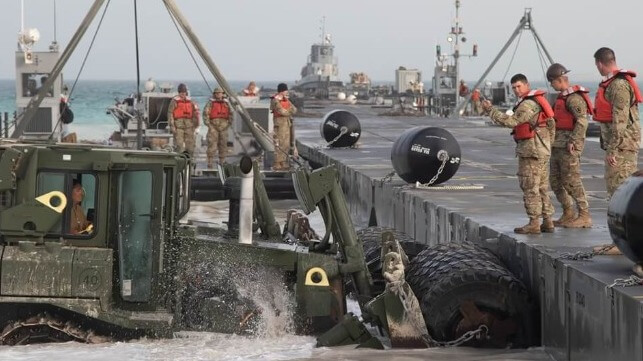U.S. Says Gaza Maritime Aid Corridor Will Not Be Enough

When U.S. President Joe Biden delivered his State of the Union address last week, he put special emphasis on a new maritime corridor that will "enable a massive increase in the amount of humanitarian assistance getting into Gaza every day." On Wednesday, top officials from the U.S. and the EU said that Biden's high-profile maritime route will not be enough to solve the problem, and that Israel must reopen land corridors for aid convoys to pass - a politically-difficult choice for Israeli leadership.
"There is no meaningful substitute to land routes via Egypt and Jordan and entry points from Israel into Gaza for aid delivery at scale," said U.S. Secretary of State Antony Blinken, EU Crisis Management Commissioner Janez Lenarcic and UK Foreign Minister David Cameron in a joint statement. Top officials from the UN, UAE and Qatar also joined the communique.
The message echoes persistent warnings from the humanitarian aid community about the capacity and timing of the operation. The White House has dispatched U.S. Army landing craft and other assets to set up a Joint Logistics Over The Shore (JLOTS) operation in Gaza, which will turn an unimproved beach into a working pier. The mission departed this week, and the operation could be functioning within two months' time.
That may be too late, according to aid groups like Save the Children. The death toll from starvation in Gaza stands at about 30 cases and is expected to rise; the UN may formally declare a famine in the territory before the end of this week.

that matters most
Get the latest maritime news delivered to your inbox daily.
In Wednesday's communique, the U.S. and EU said that the maritime corridor must be part of a broader effort to move aid and commercial goods into Gaza "through all possible routes - including expanded land routes." To improve on the maritime delivery component, they said that if Israel opened the Port of Ashdod to humanitarian shipments, it would be "a welcome and significant complement" to the corridor. This would add a true deepwater port to the improvised route for the first time, but would require Israel to allow truck deliveries from Ashdod into Gaza.
Food aid access is a politically fraught issue for Israel's coalition government. Security minister Itamar Ben Gvir, advocates restricting food and medical aid deliveries to Gaza until after Hamas agrees to release its remaining Israeli hostages. In late February, after a failed truck convoy operation, Ben Gvir argued that allowing humanitarian aid to enter the Gaza Strip is "madness" until the last 130 Israeli abductees are safely returned.
